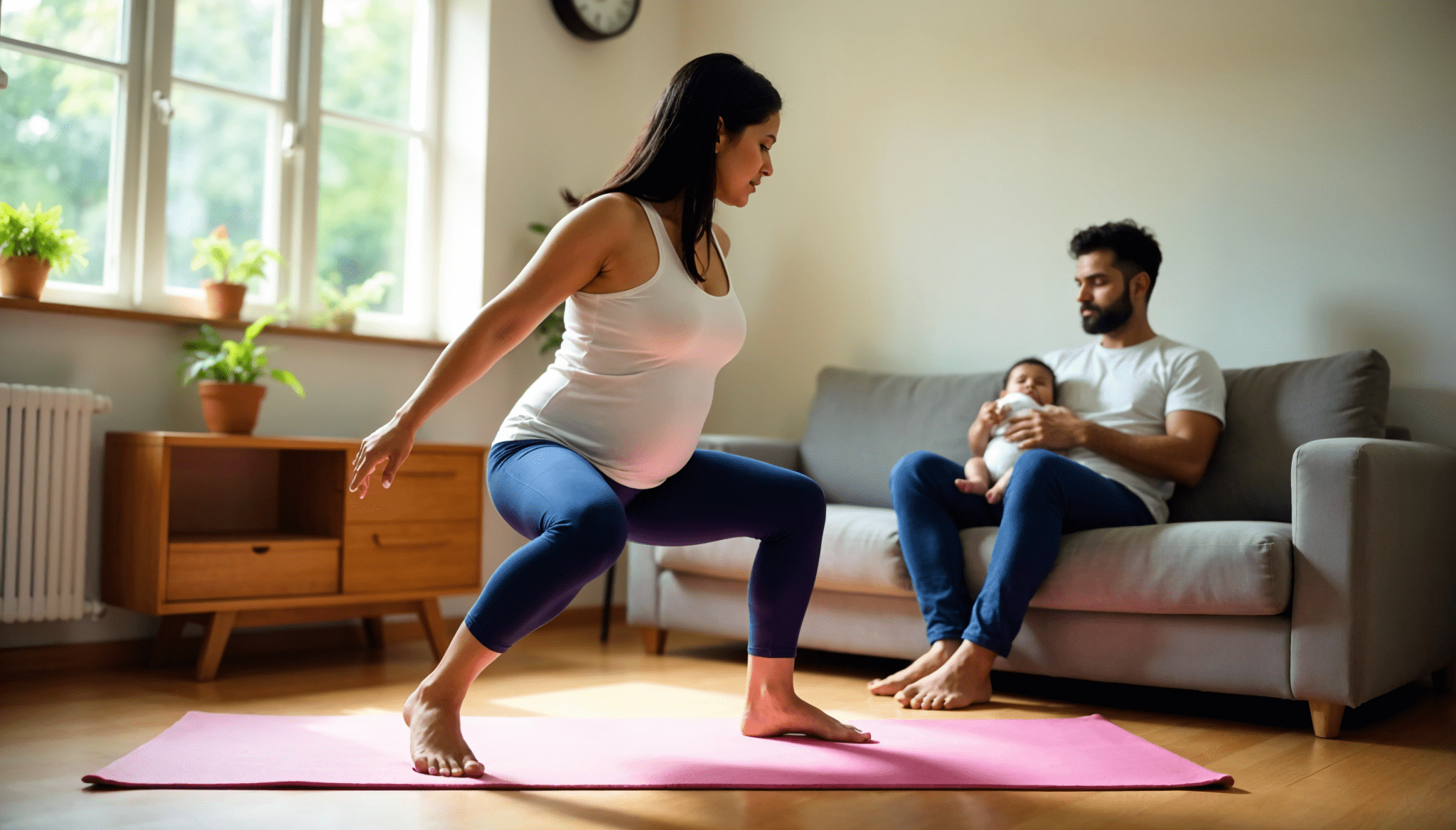Congratulations on the arrival of your little bundle of joy! Now that your little one is here, you might be eager to get back in shape and regain your pre-pregnancy fitness level. But where do you start? Don’t worry, we’ve got you covered! In this postpartum fitness guide, we’ll share 7 effective tips to help you get back in shape after delivery.
From easing into exercise to prioritizing self-care, we’ll cover all aspects of postpartum fitness. Our expert advice will provide you with a roadmap to gradually rebuild your strength, boost your energy levels, and improve your overall well-being.
But remember, postpartum fitness is not just about shedding those extra pounds. It’s also about nurturing your body, regaining confidence, and embracing this new chapter of motherhood. Our tips will not only focus on physical fitness but also address mental health and emotional well-being.
Whether you had a natural delivery or a C-section, these tips are applicable to all new moms. So, let’s embark on this journey together and prioritize your health while enjoying the beautiful moments with your baby.
Importance of postpartum fitness
Regaining your pre-pregnancy fitness level after childbirth is not just about aesthetics – it’s a crucial aspect of your overall health and well-being. Engaging in postpartum fitness can provide numerous benefits that extend far beyond the physical realm.
Firstly, regular exercise can help you regain your strength, improve your endurance, and alleviate common postpartum issues such as back pain, joint discomfort, and muscle weakness. By gradually rebuilding your physical capabilities, you’ll be better equipped to handle the demands of motherhood, from carrying your baby to performing daily tasks with ease.
Moreover, postpartum fitness can have a profound impact on your mental health. Exercise has been shown to release endorphins, which can help alleviate symptoms of postpartum depression and anxiety. By prioritizing your physical well-being, you’re also nurturing your emotional resilience, which is crucial during this transformative period.
Beyond the physical and mental benefits, postpartum fitness can also boost your energy levels, improve your sleep quality, and enhance your overall sense of well-being. As a new mom, you’ll need all the energy you can muster to care for your little one, and a consistent fitness routine can help you maintain the stamina and vitality you need to thrive.
Understanding your body after delivery
After the incredible journey of pregnancy and childbirth, your body has undergone significant changes, both physically and hormonally. It’s important to approach your postpartum fitness journey with a deep understanding and respect for these transformations.
During pregnancy, your body produced higher levels of hormones such as estrogen, progesterone, and relaxin to support the growth and development of your baby. After delivery, these hormone levels begin to fluctuate and gradually return to pre-pregnancy levels. This hormonal shift can affect your joint flexibility, muscle strength, and overall energy levels, so it’s crucial to listen to your body and adjust your fitness routine accordingly.
Additionally, the physical demands of pregnancy and childbirth can take a toll on your body. Whether you had a vaginal delivery or a C-section, your core muscles, pelvic floor, and other areas may require time and specialized attention to heal and regain their strength. Rushing into high-intensity exercises too soon can lead to complications, so it’s essential to work closely with your healthcare provider to develop a safe and effective postpartum fitness plan.
Remember, every woman’s postpartum experience is unique, and the timeline for recovery can vary. Be patient and compassionate with yourself as you navigate this new phase. By understanding the changes your body has undergone, you can tailor your fitness approach to meet your individual needs and ensure a safe and sustainable journey back to optimal health.
Consultation with a healthcare professional
Before embarking on your postpartum fitness journey, it’s crucial to consult with a healthcare professional, such as your obstetrician, midwife, or a pelvic health physiotherapist. These experts can provide valuable guidance and personalized recommendations to ensure your safe and effective return to exercise.
Your initial postpartum checkup with your healthcare provider is an excellent opportunity to discuss your fitness goals and any concerns you may have. They can assess your overall health, evaluate the progress of your recovery, and advise you on the appropriate timeline and approach for reintroducing physical activity.
A pelvic health physiotherapist can be particularly helpful in addressing any pelvic floor or core-related issues you may be experiencing, such as incontinence, diastasis recti (abdominal separation), or pelvic pain. They can provide specialized exercises and techniques to help you safely rebuild your strength and stability in these crucial areas.
Additionally, your healthcare provider can recommend any necessary modifications or adjustments to your fitness routine based on your individual circumstances, such as a C-section, complications during delivery, or pre-existing medical conditions. By working closely with these professionals, you can ensure that your postpartum fitness journey is tailored to your unique needs and supports your overall well-being.
Starting slow and gradually increasing intensity
After the physical demands of pregnancy and childbirth, it’s important to approach your postpartum fitness journey with patience and care. Rushing into high-intensity workouts too soon can lead to injury, setbacks, and burnout. Instead, focus on starting slow and gradually increasing the intensity of your exercises as your body adapts and regains its strength.
Begin with gentle, low-impact activities such as walking, pelvic floor exercises, and light strength training. These exercises can help you rebuild your foundation, improve your cardiovascular fitness, and strengthen your core and pelvic floor without putting undue stress on your body.
As you progress, gradually introduce more challenging exercises, such as jogging, swimming, or resistance training. Pay close attention to your body’s cues and be mindful of any discomfort or pain. If you experience any concerning symptoms, such as incontinence, dizziness, or excessive fatigue, it’s important to consult with your healthcare provider before continuing your fitness routine.
Remember, the pace of your postpartum fitness journey is unique to you. Some women may feel ready to increase the intensity of their workouts within a few weeks, while others may need several months to build up their strength and endurance. Respect your body’s needs and adjust your fitness plan accordingly, celebrating each small milestone along the way.
Incorporating a variety of exercises
To achieve a well-rounded postpartum fitness regimen, it’s essential to incorporate a variety of exercises that target different aspects of your physical health. By diversifying your workout routine, you can address multiple areas of fitness, prevent boredom, and ensure that your body is receiving the comprehensive support it needs during this transformative period.
Start by including a combination of cardiovascular, strength training, and flexibility exercises in your routine. Cardiovascular activities, such as brisk walking, swimming, or low-impact aerobics, can help improve your endurance, boost your metabolism, and support your overall heart health.
Strength training exercises, such as bodyweight exercises, resistance band workouts, or light weightlifting, can help rebuild and maintain your muscle tone, improve your posture, and enhance your overall strength. These exercises are particularly important for addressing any core or pelvic floor weaknesses that may have developed during pregnancy and childbirth.
Flexibility and mobility exercises, such as gentle stretching, yoga, or Pilates, can help improve your range of motion, reduce the risk of injury, and promote better postural alignment. These activities can also be beneficial for managing any lingering discomfort or tension in your body.
Nutrition and hydration for postpartum fitness
Proper nutrition and hydration are essential components of a successful postpartum fitness journey. By fueling your body with the right nutrients and staying well-hydrated, you can support your recovery, boost your energy levels, and optimize your overall physical and mental well-being.
As a new mom, your nutritional needs may have shifted, and it’s important to adjust your dietary habits accordingly. Aim for a balanced, nutrient-dense diet that includes a variety of whole foods, such as lean proteins, complex carbohydrates, healthy fats, and an abundance of fruits and vegetables. These nutrient-rich foods can provide the necessary building blocks for tissue repair, muscle growth, and overall bodily function.
Pay special attention to your protein intake, as it plays a crucial role in maintaining and rebuilding muscle mass. Incorporate high-quality protein sources, such as lean meats, poultry, fish, eggs, legumes, and dairy products, into your meals and snacks. Additionally, consider supplementing with a high-quality protein powder or shake to ensure you’re meeting your increased protein needs during this time.
Staying hydrated is also paramount for postpartum fitness. Aim to drink plenty of water throughout the day, as it supports various bodily functions, including muscle recovery, joint lubrication, and waste elimination. If you’re breastfeeding, your hydration needs may be even higher, so be sure to replenish fluids regularly.
Emotional well-being and self-care during postpartum fitness journey
Embarking on a postpartum fitness journey is not just about physical transformation; it’s also a crucial aspect of your emotional and mental well-being. As you navigate the challenges and joys of new motherhood, it’s essential to prioritize self-care and nurture your emotional resilience.
The postpartum period can be a rollercoaster of emotions, with feelings of joy, exhaustion, and everything in between. Exercise can be a powerful tool for managing these emotions, as it has been shown to alleviate symptoms of postpartum depression and anxiety. By engaging in regular physical activity, you can release endorphins, boost your mood, and improve your overall sense of well-being.
However, it’s important to approach your fitness routine with compassion and understanding. Some days, you may feel more energized and motivated, while other days, you may struggle to find the time or energy to exercise. Be kind to yourself and adjust your expectations accordingly. Celebrate small victories and don’t be too hard on yourself if you need to take a break or modify your workout.
In addition to exercise, incorporate other self-care practices into your daily routine, such as meditation, deep breathing, or journaling. These activities can help you manage stress, promote relaxation, and cultivate a sense of inner peace during this transformative period. Surround yourself with a supportive network of family and friends, and don’t hesitate to seek professional help if you’re experiencing persistent emotional challenges.
Finding support and accountability
Embarking on a postpartum fitness journey can be more manageable and enjoyable when you have a strong support system and a sense of accountability. Connecting with others who are on a similar path can provide invaluable encouragement, motivation, and practical advice.
Consider joining a local postpartum fitness group or online community where you can connect with other new moms. These groups can offer a safe and supportive space to share your experiences, ask questions, and find inspiration. Participating in group classes or virtual workout sessions can also help you stay motivated and accountable, as you’ll be part of a community working towards similar goals.
Enlisting the help of a personal trainer or postpartum-specialized fitness coach can also be incredibly beneficial. These professionals can design a customized workout plan, provide guidance on proper form and technique, and offer encouragement and accountability throughout your journey. They can also help you navigate any postpartum-specific concerns and ensure that your fitness routine is tailored to your individual needs.
Additionally, consider involving your partner, family, or friends in your fitness journey. Engaging in physical activities together, such as going for walks or trying new workouts, can make the experience more enjoyable and foster a sense of shared accomplishment. Your loved ones can also provide practical support, such as offering to watch the baby while you exercise or preparing healthy meals to fuel your workouts.
Tracking progress and setting realistic goals
As you embark on your postpartum fitness journey, it’s important to establish realistic goals and track your progress to stay motivated and celebrate your achievements. This not only helps you measure your success but also allows you to adjust your approach as needed.
Start by setting specific, measurable, and achievable goals that align with your overall fitness objectives. These goals can be related to physical performance, such as increasing the duration or intensity of your workouts, or they can be focused on improving your overall health and well-being, such as enhancing your energy levels or reducing postpartum discomfort.
To track your progress, consider using a fitness tracker, a journal, or a mobile app to record your workouts, monitor your heart rate, and track your improvements over time. This data can provide valuable insights into your fitness progress and help you identify areas where you may need to adjust your approach.
Remember to be patient and celebrate the small wins along the way. Postpartum fitness is a journey, and it’s important to acknowledge your progress, even if it’s not as fast as you’d like. Adjust your goals as needed, and don’t hesitate to seek guidance from your healthcare provider or a fitness professional if you’re unsure about your progress or need additional support.
Conclusion: Celebrating your postpartum fitness journey
Congratulations on taking the first step towards reclaiming your postpartum fitness! By following the tips and guidance outlined in this article, you are well on your way to a healthier, stronger, and more confident you.
Remember, your postpartum fitness journey is unique to you, and it’s important to approach it with patience, self-compassion, and a focus on overall well-being, not just physical transformation. Celebrate every small victory, whether it’s completing a workout, feeling more energized, or simply taking time for yourself.
As you continue to prioritize your health and fitness, you’ll not only reap the physical benefits but also experience the profound impact on your mental and emotional well-being. Embrace this transformative period with open arms, and know that you have the strength and resilience to achieve your goals.
Wishing you all the best on your postpartum fitness journey. May it be a rewarding, empowering, and joyful experience as you navigate the beautiful and challenging chapter of motherhood.





